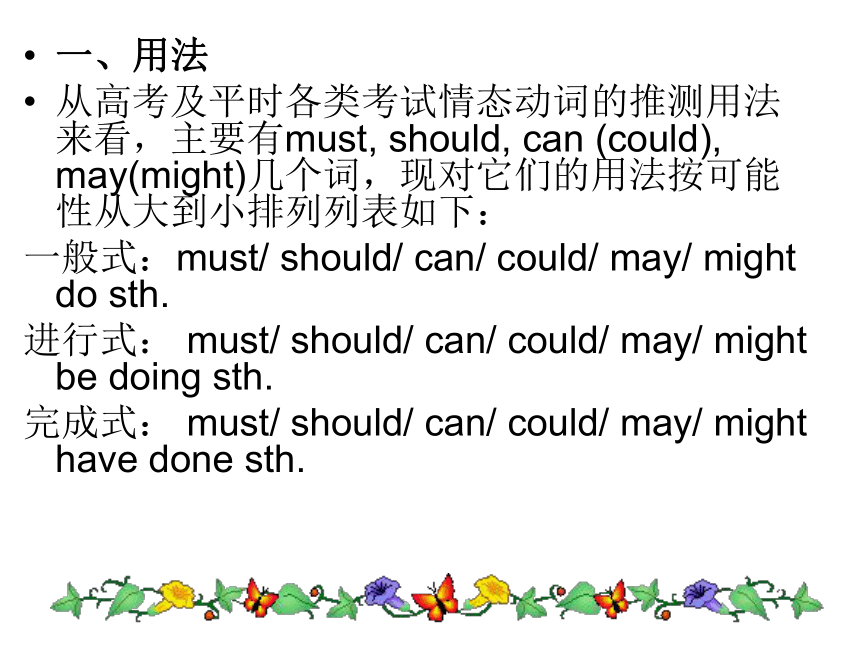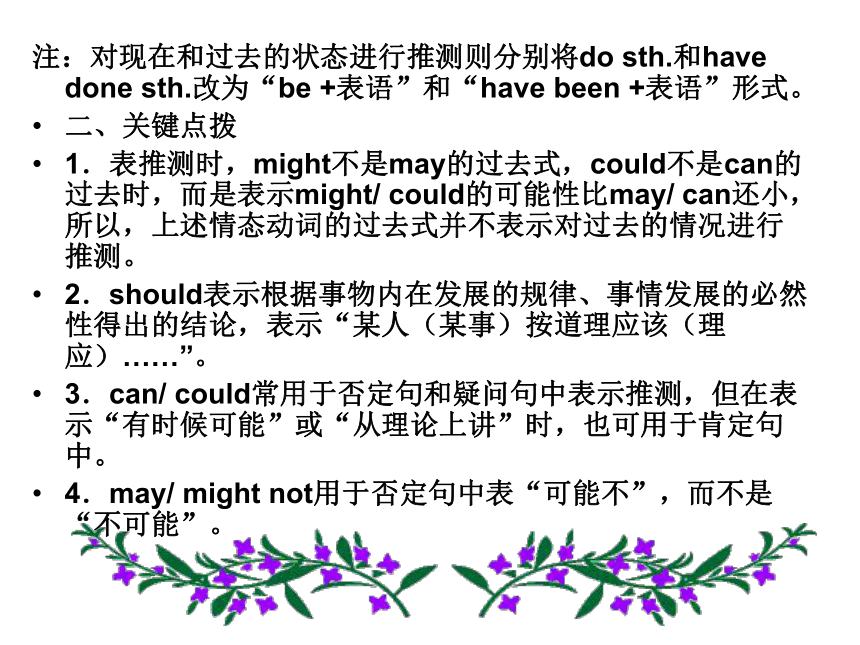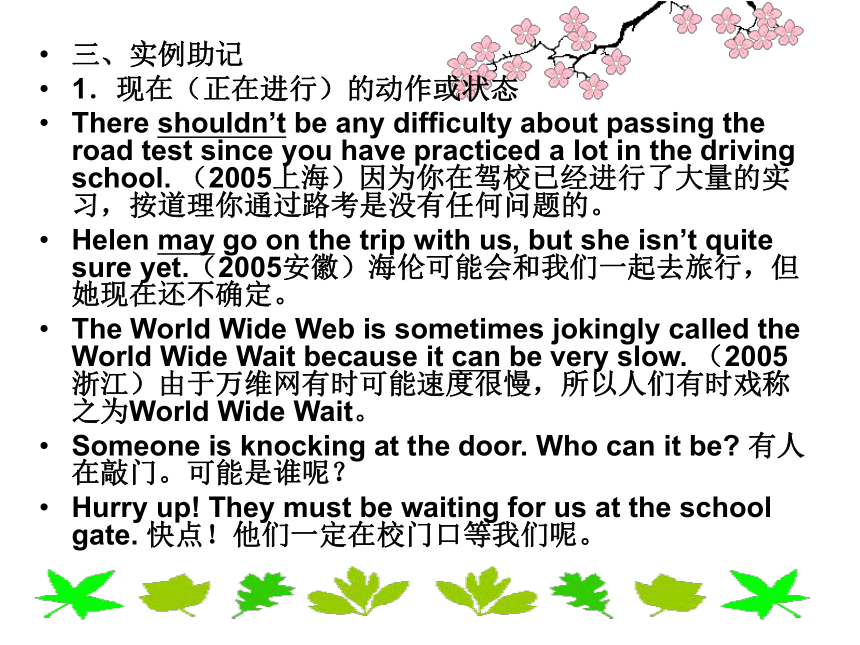情态动词表示推测
图片预览




文档简介
课件9张PPT。?
情态动词推测用法一、用法
从高考及平时各类考试情态动词的推测用法来看,主要有must, should, can (could), may(might)几个词,现对它们的用法按可能性从大到小排列列表如下:
一般式:must/ should/ can/ could/ may/ might do sth.
进行式: must/ should/ can/ could/ may/ might be doing sth.
完成式: must/ should/ can/ could/ may/ might have done sth.
注:对现在和过去的状态进行推测则分别将do sth.和have done sth.改为“be +表语”和“have been +表语”形式。
二、关键点拨
1.表推测时,might不是may的过去式,could不是can的过去时,而是表示might/ could的可能性比may/ can还小,所以,上述情态动词的过去式并不表示对过去的情况进行推测。
2.should表示根据事物内在发展的规律、事情发展的必然性得出的结论,表示“某人(某事)按道理应该(理应)……”。
3.can/ could常用于否定句和疑问句中表示推测,但在表示“有时候可能”或“从理论上讲”时,也可用于肯定句中。
4.may/ might not用于否定句中表“可能不”,而不是“不可能”。三、实例助记
1.现在(正在进行)的动作或状态
There shouldn’t be any difficulty about passing the road test since you have practiced a lot in the driving school. (2005上海)因为你在驾校已经进行了大量的实习,按道理你通过路考是没有任何问题的。
Helen may go on the trip with us, but she isn’t quite sure yet.(2005安徽)海伦可能会和我们一起去旅行,但她现在还不确定。
The World Wide Web is sometimes jokingly called the World Wide Wait because it can be very slow. (2005浙江)由于万维网有时可能速度很慢,所以人们有时戏称之为World Wide Wait。
Someone is knocking at the door. Who can it be? 有人在敲门。可能是谁呢?
Hurry up! They must be waiting for us at the school gate. 快点!他们一定在校门口等我们呢。2.过去(正在进行)的动作或状态
—Tom is never late for work. Why is he absent today? 汤姆从不上班不迟到。为何他今天没来?
—Something must have happened to him.(2005江西)他一定发生了什么事。
I was on the highway when this car went past followed by a police car. They must have been doing at least 150 kilometers an hour. (2005重庆)我当时正在公路上行驶,突然这辆小汽车超过,后面跟着一辆警车。他们当时一定是在以至少每小时150公里的时速行驶。
—Do you know where David is? I couldn’t find him anywhere. 你知道大卫在哪里吗?我到处找不到他。
—Well . He can’t have gone far—his coat’s still here.(2005湖北)噢。他不可能走远的——他的外套还在这儿。
I can’t find my dictionary. Li Hong may have taken it away. 我找不着字典了。李红可能拿走了。1. He ______ have completed his work; otherwise, he wouldn’t be enjoying himself by the seaside. (2005北京卷)
A. should B. must
C. wouldn’t D. can’t
2. This cake is very sweet. You ______ a lot of sugar in it.(2005辽宁卷)
A. should put B. could have put C. might put D. must have put
3. —Is John coming by train?
—He should, but he ______ not. He likes driving his car. (NMET2002)
A. must B. can C. need D. may4. My English-Chinese dictionary has disappeared. Who ______ have taken it?(2003上海春季)
A. should B. must C. could D. would
5. —When can I come for the photos? I need them tomorrow afternoon.
—They ______ be ready by 12:00.(NMET1998)
A. can B. should C. might D. need
6. —Isn’t that Ann’s husband over there?
—No, it ______ be him—I’m sure he doesn’t wear glasses.(NMET2004)
A. can’t B. must not C. won’t D. may not7. —Excuse me. Is this the right way to the Summer Palace?
—Sorry, I am not sure. But it ______ be.(2004湖北)
A. might B. will C. must D. can
8. My sister met him at the Grand Theatre yesterday afternoon, so he ______ your lecture.(2000上海)
A. couldn’t have attended B. needn’t have attended
C. mustn’t have attended D. shouldn’t have attended
9. Sorry, I’m late. I ______ have turned off the alarm clock and gone back to sleep again.(2000北京春季)
A. should B. can C. might D. will
10. It’s nearly seven o’clock. Jack ______ be here at any moment.(NMET 1995)
A. must B. need C. should D. can
情态动词推测用法一、用法
从高考及平时各类考试情态动词的推测用法来看,主要有must, should, can (could), may(might)几个词,现对它们的用法按可能性从大到小排列列表如下:
一般式:must/ should/ can/ could/ may/ might do sth.
进行式: must/ should/ can/ could/ may/ might be doing sth.
完成式: must/ should/ can/ could/ may/ might have done sth.
注:对现在和过去的状态进行推测则分别将do sth.和have done sth.改为“be +表语”和“have been +表语”形式。
二、关键点拨
1.表推测时,might不是may的过去式,could不是can的过去时,而是表示might/ could的可能性比may/ can还小,所以,上述情态动词的过去式并不表示对过去的情况进行推测。
2.should表示根据事物内在发展的规律、事情发展的必然性得出的结论,表示“某人(某事)按道理应该(理应)……”。
3.can/ could常用于否定句和疑问句中表示推测,但在表示“有时候可能”或“从理论上讲”时,也可用于肯定句中。
4.may/ might not用于否定句中表“可能不”,而不是“不可能”。三、实例助记
1.现在(正在进行)的动作或状态
There shouldn’t be any difficulty about passing the road test since you have practiced a lot in the driving school. (2005上海)因为你在驾校已经进行了大量的实习,按道理你通过路考是没有任何问题的。
Helen may go on the trip with us, but she isn’t quite sure yet.(2005安徽)海伦可能会和我们一起去旅行,但她现在还不确定。
The World Wide Web is sometimes jokingly called the World Wide Wait because it can be very slow. (2005浙江)由于万维网有时可能速度很慢,所以人们有时戏称之为World Wide Wait。
Someone is knocking at the door. Who can it be? 有人在敲门。可能是谁呢?
Hurry up! They must be waiting for us at the school gate. 快点!他们一定在校门口等我们呢。2.过去(正在进行)的动作或状态
—Tom is never late for work. Why is he absent today? 汤姆从不上班不迟到。为何他今天没来?
—Something must have happened to him.(2005江西)他一定发生了什么事。
I was on the highway when this car went past followed by a police car. They must have been doing at least 150 kilometers an hour. (2005重庆)我当时正在公路上行驶,突然这辆小汽车超过,后面跟着一辆警车。他们当时一定是在以至少每小时150公里的时速行驶。
—Do you know where David is? I couldn’t find him anywhere. 你知道大卫在哪里吗?我到处找不到他。
—Well . He can’t have gone far—his coat’s still here.(2005湖北)噢。他不可能走远的——他的外套还在这儿。
I can’t find my dictionary. Li Hong may have taken it away. 我找不着字典了。李红可能拿走了。1. He ______ have completed his work; otherwise, he wouldn’t be enjoying himself by the seaside. (2005北京卷)
A. should B. must
C. wouldn’t D. can’t
2. This cake is very sweet. You ______ a lot of sugar in it.(2005辽宁卷)
A. should put B. could have put C. might put D. must have put
3. —Is John coming by train?
—He should, but he ______ not. He likes driving his car. (NMET2002)
A. must B. can C. need D. may4. My English-Chinese dictionary has disappeared. Who ______ have taken it?(2003上海春季)
A. should B. must C. could D. would
5. —When can I come for the photos? I need them tomorrow afternoon.
—They ______ be ready by 12:00.(NMET1998)
A. can B. should C. might D. need
6. —Isn’t that Ann’s husband over there?
—No, it ______ be him—I’m sure he doesn’t wear glasses.(NMET2004)
A. can’t B. must not C. won’t D. may not7. —Excuse me. Is this the right way to the Summer Palace?
—Sorry, I am not sure. But it ______ be.(2004湖北)
A. might B. will C. must D. can
8. My sister met him at the Grand Theatre yesterday afternoon, so he ______ your lecture.(2000上海)
A. couldn’t have attended B. needn’t have attended
C. mustn’t have attended D. shouldn’t have attended
9. Sorry, I’m late. I ______ have turned off the alarm clock and gone back to sleep again.(2000北京春季)
A. should B. can C. might D. will
10. It’s nearly seven o’clock. Jack ______ be here at any moment.(NMET 1995)
A. must B. need C. should D. can
